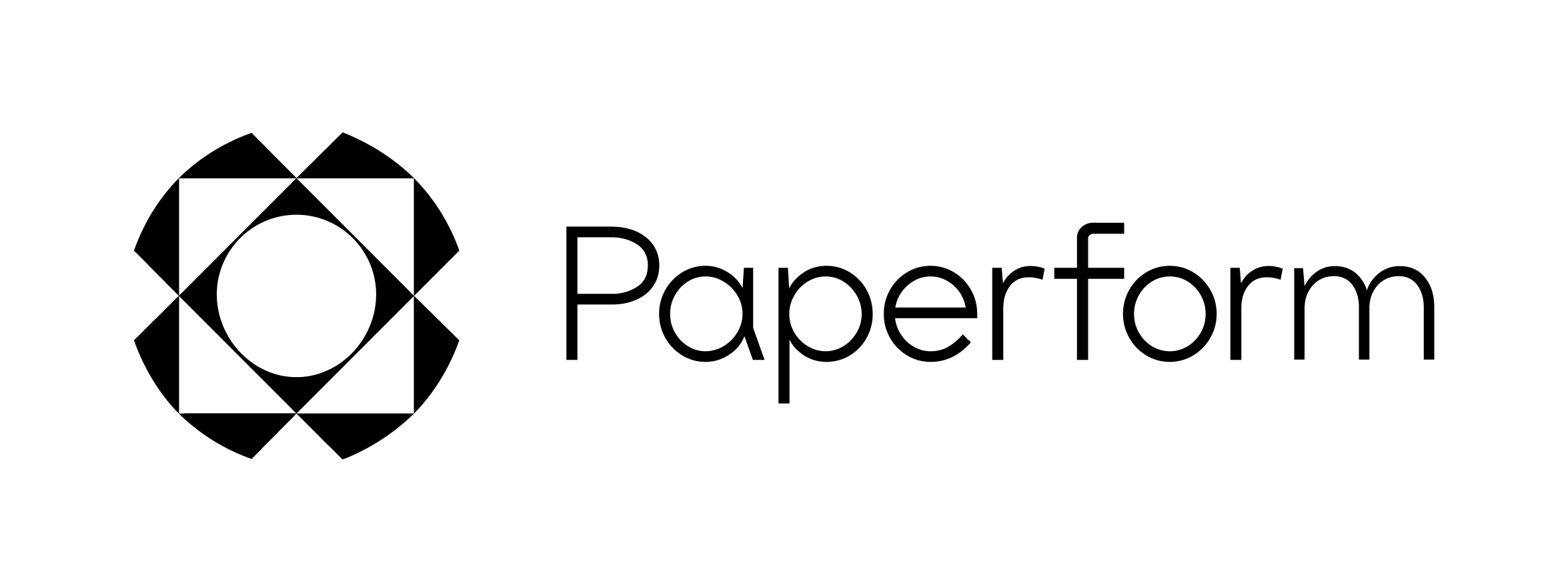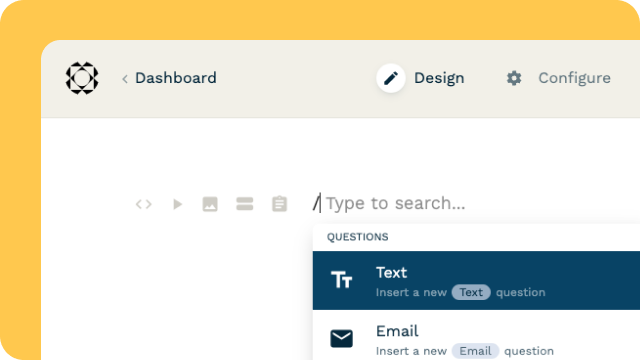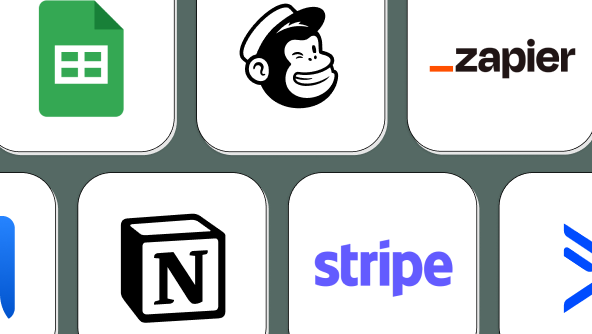
All Solutions

Explore all the solutions you can create with Paperform: surveys, quizzes, tests, payment forms, scheduling forms, and a whole lot more.
See all solutions











Connect with over 2,000 popular apps and software to improve productivity and automate workflows
See all integrationsProducts
Solutions
All Solutions

Explore all the solutions you can create with Paperform: surveys, quizzes, tests, payment forms, scheduling forms, and a whole lot more.
See all solutionsIntegrations

Connect with over 2,000 popular apps and software to improve productivity and automate workflows
See all integrationsResources
A New Dream for Humanity: A Conversation with Mario Trigueros

In our Conversations series, we catch up with some of the inspiring charitable organisations using Paperform. It's a chance to shine a spotlight on important causes and celebrate partnerships we're particularly proud of.
For the inaugural episode, we spoke with Mario Trigueros, the Managing Director of the Pachamama Alliance, who've been users since the early days of Paperform.
We chat to Mario about Pachamama Alliance's mission to preserve Indigenous cultures of the Amazon and how they use our platform to help them achieve it. You can check out the full video below, or read along with the transcript.
Editor's note: The transcript has been edited and condensed for clarity. The headings are questions posed by Alex, and the body of the text are Mario's responses.
Could you start by giving us a quick rundown of how Pachamama Alliance started?
Work began about 25 years ago in Ecuador. It didn’t begin with any kind of ideal plans to do anything. At some point it'd be fun to talk about the sort of more mystical ways it began, but fundamentally, a group of people and an Indigenous tribe deep in the rainforest of Ecuador made an alliance with somebody out there who had friends in the Global North.
They saw the extraction and oil development that was happening in their territories, in particular, upstream from where they were in the incredible Pastaza River. They saw the devastation that was happening [in the Amazon Rainforest].
Lots of tribes were mobilising efforts to resists. Sometimes they would kill oil drillers, they were lobbying their governments, they were trying anything they could do. But this specific tribe reached out to the Global North to find allies to help them and they managed to reach John Perkins, who was in the Peace Corps at the time nearby, and Bill and Lynn Twist.
They formed a motley group of people. They didn't have any intention of doing this kind of work, but the Indigenous people there asked for help. They spoke to the importance of that region and the Twists and John were deeply inspired. And so it [the Pachamama Alliance] began.
For the first five years, it was a partnership to really support their work, preservation territory and culture. But eventually it became clear that the pressures could not just be fought in Ecuador and could not just be fought with one oil company at a time.
There was clearly a cultural element happening and they gave us a charge for what they say was 'to change the dream of the modern world'. They saw that consumerism and our relationship to nature was at the heart of what was causing the crises that they were facing. And so what they said is, 'this is great partnership, let's continue, but we really have to go home and do the work at home.'
And that really became what Pachamama Alliance is today. Part of our work is down to indigenous and rainforest advocacy in the Amazon. The other half is educational and activist work in the Global North to really get at the heart of what is causing the pressure down there.
Stopping the damage corporations are doing to the rainforest is part of it, but it’s also about taking a step back and challenging our own beliefs and practices in the West. Is that right?
Positively. I mean, don't get me wrong, the oil companies have a lot to account for, but when you form relationships with indigenous people, you get this realisation that there's so much that we have forgotten as people in the 'modern world'. They actually live in a way that feels far more natural.
 (Image Source: Waren Brasse)
(Image Source: Waren Brasse)And so a ton of our work is remembering because of the partnership that we have. Remembering our true nature and our true nature is that we need each other. Our true nature is that we’re part of a living system that is Mother Earth and when we become alienated to that, it actually allows so much hurt and destruction.
Pachamama translates to ‘World Mother’ or ‘Mother Earth’ and a lot of what you focus on is about the connection of the modern world to the planet. Could you elaborate on the relationship between Pachamama Alliance and those Amazonian tribes?
Yeah, there’s a ton of work that goes into helping protect their territory and also themselves. A lot of NGOs start with their own agenda, you know, it’s usually ‘we want to protect this area and there happen to be Indigenous people there, so let’s make allies.’
I don't mean to disparage that model, but like we didn't start like that. We started with relationships with people. What we would hear from them were things like ‘I've got to go to a government meeting and I don't know how to get to the city’, so they need taxi fare and a place to stay when they’re in the city.
Most NGOs don't pay for that. They want to pay for a big campaign. A big action. A ton of the work that we do is just so that people can actually organise and mobilise with each other. We support Federations, which are the councils set up by individual Indigenous nations. We keep the lights on in those places.
They get money from the UN and from different places, but those tend to be for kind of very surgical campaigns. We support them to meet together, to travel together. We’ve bought them radios so they can communicate with each other.
We have supported them developing their own independent airline. This can sound kind of counter-intuitive, but roads are one of the most destructive things that can happen in a Rainforest. Roads bring trucks and loggers and miners.
One of the key things is to never allow roads into the deep territories of the Rainforest, which means you need airstrips and airplanes. And so one of the ways that we really protect their territory is by supporting the running of airlines and airstrips.
A huge chunk of our work is actually helping them to support themselves. There's a huge campaign we're doing right now called the Sacred Headwaters Initiative, which is aiming to make a huge region of the Amazon independent, autonomous and free from any kind of extraction or development of any kind, as well as independently run by Indigenous people there.
There are so many layers to what Pachamama Alliance achieves and supports. Can you tell us about the educational programs you run?
Sure, so we’ve got the advocacy work that happens in Ecuador and Peru. On the other side, as you pointed out, there are a whole suite of program that we’ve got. They’re kind of twofold: one is to just wake people up to our lifestyles and our impact and what’s possible when we wake up, at least in the United States.
Many us have this sense of separation from each other. We live on blocks where we don't know our neighbours, we shop and eat to make herself feel good. Obesity runs rampant. Depression runs rampant. Our first thing is to simply wake people up to what we call 'the trends of the modern world'.
We think we need to buy. We need to attain. We need to get something that will fill this vacancy we have in our hearts and, really, in our souls. We've got a suite of things that simply wake people up to some of the most critical things going on in the world today and, and in particular, that sense of separation.
We've got a pathway called the 'Up To Us Engagement Pathway’ and it begins with this wake up call. This is informed by our Indigenous partners, who have a dream culture. They deeply follow their dreams. They wake up every morning, talk about their dreams and that dictates what they'll do for the day—‘Oh, that's you dreamt of a snake? Good. Let's stay out of that section of the jungle.’
We created a program called ‘Awakening the Dreamer' that's really a call for us to wake up from this trance of the modern world of consumerism and whatnot. It introduces people to this sense of interconnectedness that I was talking about.
Then we also have an eight-week deep dive called the ‘Game Changer Intensive’, a course that really tries to mobilise people, ground them and make them focus on critical questions.
Everyone’s focused on ‘what do I do?’ and that’s one of the questions, but the other ones that are equally important is ‘who do you need to be and what do you need to do to create a world that works for all?’
Half of those eight weeks is focused on things like cultivating our sense of story, developing a sense of grounded optimism and cultivating a sense of our interconnectedness with nature. Then we pivot to political things of democracy, climate change and inequality.
From there, we mobilise people into communities and action trainings, where we train them on organising. We support local community and really get people on the ground so they can bring all these things they’ve learned together to protect and take action within their communities.
 (Image Source: Vlad Hilitanu)
(Image Source: Vlad Hilitanu)Alex: How does Paperform support the great work of Pachamama Alliance as you attempt to drive these changes?
Mario: Nonprofits are used to putting things together with duct tape and glue. We don’t have a lot of money. The tools we use tend to be either outdated or ugly, and we don’t tend to be terribly technical.
We don’t have a ton of resources to spend on flashy platforms. And all those things: the flashy platforms or elegant systems, give credibility to people. You know, if I go to a defunct website for a charity that I think does really amazing work, I can't help but think, ‘well, they couldn't really be doing that much if they can't even have a decent form or website’.
The fundamental thing is that you give us a level of professionalism and polish and engagement that builds a sense of trust with the people we want to reach. You give us credibility. In the past we were using forms that were just ugly. They were hideous.
It [Paperform] just gives a sense of beauty and, and I think it sets people at ease in a way that we want them to be. We don't want technology to be in people's faces. We want it to be natural and invisible so that when people fill out a form, it’s not a pain in the butt or an eyesore. It's simple and elegant and just another way of engaging in the online world.
You've got a beautiful platform with just the right functionality that’s beautiful and easy to use. Our use of forms has skyrocketed. I was just looking at all the forms that we've got. We have them in different departments internally and externally.
We use them to assess people and to look at the impact of our programs and for surveys that integrate with Salesforce—we literally use them all over the place.
We use forms now in places when we started this people just wouldn’t. It’s just so easy that it has become sort of second nature. Now we know that as an organisation we put forms in place, whether it’s tech help or other support or evaluating impact.
We know we can make an elegant solution that’s beautiful, doesn’t interfere with the experience people are having, and is also really affordable. I can’t believe the level of value we get from Paperform. It enables so much of our work. It’s a huge deal.
One other thing I wanted to say was that Paperform enabled us. Over the last few years, where we cut our teeth, our experience was mainly with in-person workshops. Those programs we spoke about happened in person. About six years ago we started moving online, and that’s around the time when I signed on with Paperform.
We built a whole online engagement apparatus. Then, when COVID hit and we had to shelter in place, we were able to pivot without skipping a beat. We had the technology, people had been using it and were comfortable with it and we were able to move all of that in-person work into an online context super seamlessly.
One of the things we're really proud of is that we helped people use our online meeting tools. Using a cool blend of Zapier and Paperform in Salesforce we found a way for people to book rooms, use Zoom as if it was a meeting room and it enabled so much of that in-person engagement to continue.
That’s rewarding to hear and we’re proud to help you make positive changes throughout the globe. Just going back to that idea of ‘waking up’, I think younger generations are starting to make that realisation.
Yeah. The younger generation of people see it so clearly that, you know, their future is going to be deeply impacted by climate change in particular.
Whether they have children, whether they’re exposed to focus fumes for months of the year—I mean I live in San Francisco and we literally have to stay indoors for several months a year because the smoke is so bad from the wildfires. Whole towns are wiped out because of these fires. It’s gotten to a point where it’s extreme.
How can people who may be interested in your cause get involved?
People can get involved by going to our website. We have a whole suite of online programs. A ton of that ‘Up To Us Engagement Pathway’ happens online, as do the ‘Wake Ups’ and the ‘Game Changer Intensive’, so people all over the world can engage.
 (Image Source: Pachama)
(Image Source: Pachama)When you go to our website you’ll find we have communities all over the world. One of our most active communities is in Australia. They both host workshops in-person and take on local projects.
It shows up differently across the world, but going to our website, engaging in some of our educational programs or finding a Pachamama Alliance community are just a few of the ways that you can engage. And we always need financial support, a good chunk of which goes to advocacy for our work in Ecuador and these educational programs too.
Thank you so much for joining me and for all that you and the Pachamama Alliance do.
It was a pleasure. I would've enjoyed talking to you no matter what. I really appreciate it. Take care.
Form a better life now.
Get your 7 day unrestricted trialSmileBox started in a bedroom and scaled to 30,000 orders. Here’s how founder Tom Wrench used Paperf...
When Kathleen Celmins launched her AI-powered app, GlowSocial, she quickly realized that building cu...
Paperform has been recognized as a 2026 G2 Best Software Award winner! It is an honour we are deeply...
Trying to decide between Zapier and Stepper? This in-depth comparison breaks down pricing models, wo...